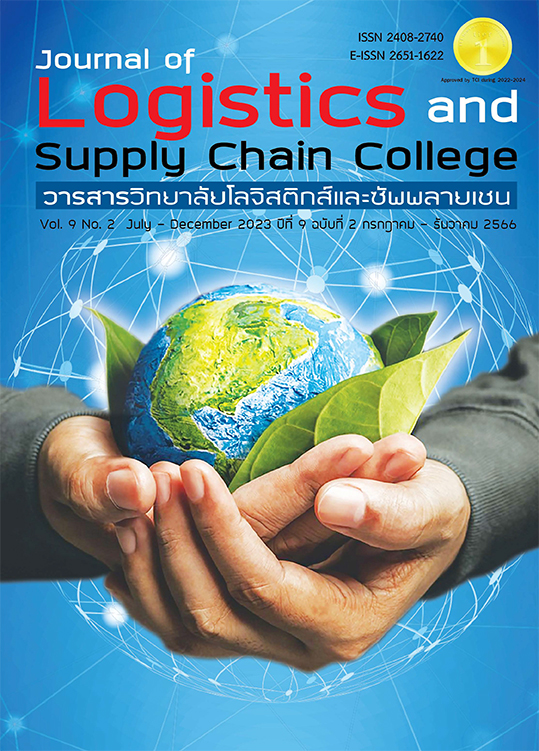An The Study Information Technology Assessment for Transportation Business with SCOR Digital Standard and COBIT2019 Standard by CMMI Model
DOI:
https://doi.org/10.53848/jlscc.v9i2.266764Keywords:
Information technology assessment, Transportation business, SCOR digital standardAbstract
The research aims to study the evaluation model of information technology for transportation businesses on appropriate services using SCOR digital standard (DS) and COBIT2019 framework through the CMMI method. The study emphasizes evaluating the transportation business service by studying basic information through various and suitable dimensions with the mixed method. The received data were to create the interview form assessed by three information technology experts, then used to interview five executives (president or vice-president of the technological management officers) and twelve involved personnel with direct experience in management and transport business service according to the SCOR DS and COBIT2019 framework, which includes ITS, DSS 01-06, and MEA02, a total of 24 Indicator/Process from 17 respondents. The results were assessed using CMMI model software and interpreted the data by level indication concordant with the contributions that occurred authentically. The result revealed from all experiences of the respondents’ professionality that all of the evaluation results as the overall image could reach the passing level from beginning to moderate only (Level1-3). Hence, it has to improve and develop services continuously and in various processes to meet the conclusion and bring the standardized performance to do the new paradigm standard, which can perfectly enhance the measurement of performance effectiveness according to the indicators, including making a conclusion of the result for criteria development of the organizational evaluation to be Smart capable of entering the sustainable digital transformation.
References
APICS. (2017). SCOR Supply Chain Operations Reference (Version 12.0). Chicago: APICS.
ASCM. (2021). SCOR Process and the Supply Chain. Retrieved 19 May 2021, From: https://www.ascm.org.
DITP. (2021). ELMA Pride of Thai Logistics Service Provider. Retrieved 30 January 2021,From: https://www.tradelogistics.go.th/ELMA/.
IEEE. (2021). A Model for Understanding Project Requirements based on CMMI Specifications. Retrieved 15 January 2022, From: https://ieeexplore.ieee.org/document/9659625.
ISACA. (2018). COBIT 2019 Intoduction and Methodology. Illinois: ISACA.
ISACA. (2018). CobiT-4th Edition (Version 2019), 3 ed. Information Systems Audit and Control Foundation. IT Governance Institute, Illinois: ISACA.
ISACA. (2019). COBIT2019 Framework Introduction and Methodology. Illinois: ISACA.
ISACA., & CMMI Performance Solution. (2022). Build Capability, Drive Performance High-performance organizations around the world have achieved demonstrable, sustainable business results with CMMI. Retrieved 10 May 2022, From: https://cmmiinstitute.com/.
ITGI. (2018). It Governance Global Status Report. IT Governance Institute, Illinois: ITGI.
Kaplan, R., & Norton, D. (2017). The Strategy Focused Company. Boston: Harvard Business School Press.
Keysha S., Maulidia I., Tasya A., & Siti M., Candiwan. (2022). Analysis of Information Technology Governance on Process Management Services and Management of Information Technology Security Using COBIT 2019 (Case Study: PT XYZ). Retrieved 18 January 2022, From: https://ieeexplore.ieee.org/abstract/document/10009924.
Maria N., Torcoroma V., & Dewar. (2023). Systematic Mapping of Literature: Governance and IT Management Practices in Organizations, under the COBIT 2019 reference framework. Retrieved 9 January 2023, From: https://ieeexplore.ieee.org/abstract/document/10035692.
Merryana, L., Ade, I., & Hendry, H. (2022). Information Technology Governance Design in DevOps-Based E-Marketplace Companies Using COBIT 2019 Framework. Retrieved 13 January 2023, From: https://doi.org/10.29407/intensif.v6i2.18104.
Muhammad Y., Arry Akhmad A., Ian Joseph M., & Wervyan S. (2020). Designing Information Security Governance Recommendations and Roadmap Using COBIT 2019 Framework and ISO 27001:2013 (Case Study Ditreskrimsus Polda XYZ). Retrieved 17 January 2021, From: https://ieeexplore.ieee.org/abstract/document/9310875.
Keneth, R.S.& Baker, E.R. (2019). Process Improvement and CMMI for Systems and Software. New York, Auerbach Publications.
Steven, De., Wim, V., Anant, Joshi., & Tim, H. (2022). Enterprise Governance of Information Technology: Achieving Alignment and Value in Digital Organizations. Retrieved 19 January 2021, From: https://link.springer.com/book/10.1007/978-3-030-25918-1.
Svetlana, M., Igor, I., Carlos, J., Ann-Kathrin, L., & Vadim, K. (2019). Balanced Scorecard for the Digital Transformation of Global Container Shipping Lines. Conference: Proceedings of the International Conference on Digital Technologies in Logistics and Infrastructure (ICDTLI 2019). Retrieved 15 September 2019. From: https://www.atlantis-ress.com/proceedings/icdtli-19/125918543.
The Supply Chain Council: SCC. (2010). Supply Chain Operations Reference Model. United States of America: SCC.
Vladimir, K., Karina, S., Elena, K., Daria, K., & Denis, S. (2022). Assessment of transport enterprise readiness for digital transformation, Transportation Research Procedia, 63(2022),2710-2718.



